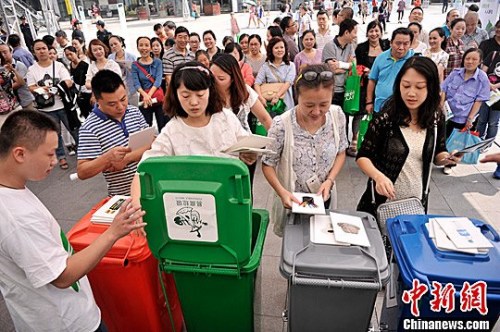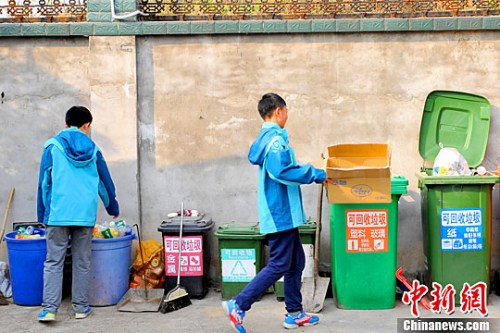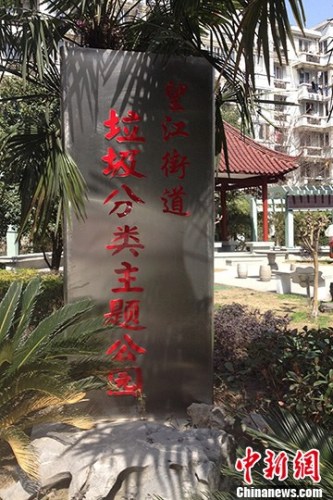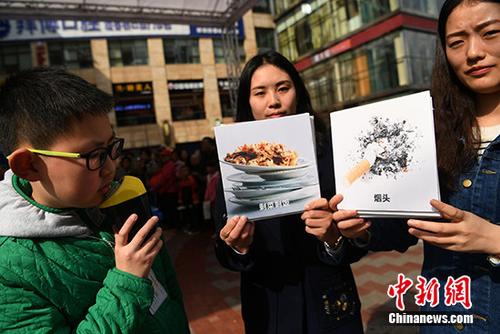BEIJING, Beijing, March 31 (Xinhua) On the 30th, the General Office of the State Council issued a notice on forwarding the Implementation Plan of Domestic Waste Classification System by the National Development and Reform Commission and the Ministry of Housing and Urban-Rural Development. The "Proposal" has formulated the implementation objectives of the domestic waste classification system, the types of waste classification, the incentive mechanism and other contents. 46 cities will implement the mandatory classification of domestic waste first. Come and see if there is your city?

By the end of 2020, the recycling rate of domestic garbage will reach over 35%.
With the development of economy and society and the substantial improvement of material consumption level, the production of domestic garbage in China has increased rapidly, and the environmental hidden dangers have become increasingly prominent, which has become a restrictive factor for the development of new urbanization.
The implementation of domestic waste classification will effectively improve the urban and rural environment, promote the recycling of resources, accelerate the construction of "two-oriented society", and improve the quality of new urbanization and the level of ecological civilization construction.
The "Proposal" proposes that by the end of 2020, a system of laws, regulations and standards related to garbage classification will be basically established, and a replicable and scalable domestic garbage classification model will be formed. In cities that implement mandatory domestic garbage classification, the recycling rate of domestic garbage will reach more than 35%.

46 cities will implement mandatory classification of domestic waste first.
According to the official plan, before the end of 2020, some key cities will implement mandatory classification of domestic waste within the urban area. These cities are municipalities directly under the central government, provincial capitals and cities under separate state planning. This means that Beijing, Shanghai, Tianjin and Chongqing, as well as five cities with separate plans, Dalian, Qingdao, Ningbo, Xiamen and Shenzhen, are among them.
Second, the first batch of domestic waste classification demonstration cities identified by the Ministry of Housing and Urban-Rural Development and other departments include: Handan City, Hebei Province, Suzhou City, Jiangsu Province, Tongling City, Anhui Province, Yichun City, Jiangxi Province, Tai ‘an City, Hubei Province, Yichang City, Guangyuan City, Sichuan Province, Deyang City, Xizang Autonomous Region Shigatse City and Xianyang City, Shaanxi Province.
That is, 46 cities across the country will implement mandatory classification of domestic waste first. Party and government organs in these cities, institutions such as schools, scientific research, culture, publishing, radio and television, associations, societies and federations, management units of public places such as stations, airports, docks, stadiums and performance venues, and enterprises such as hotels, restaurants, shopping centers, supermarkets, farmers’ markets, shops and commercial office buildings are responsible for classifying the domestic waste generated.

How to classify? What are harmful and perishable garbage?
The "Proposal" pointed out that cities that implement compulsory classification of domestic waste should formulate measures for the introduction before the end of 2017 in light of local conditions, and refine the requirements for waste classification categories, varieties, delivery, collection, transportation and disposal; Among them, harmful waste must be regarded as one of the compulsory classification categories. Garbage that is not classified shall be treated according to the existing methods.
The Plan mentions three categories: harmful waste, perishable garbage and recyclable materials.
The main varieties in harmful waste include: waste batteries (cadmium nickel batteries, mercury oxide batteries, lead storage batteries, etc.), waste fluorescent tubes (fluorescent tubes, energy-saving lamps, etc.), waste thermometers, waste sphygmomanometers, waste drugs and their packaging, waste paints, solvents and their packaging, waste pesticides, disinfectants and their packaging, waste films and waste photographic paper, etc.
The main varieties of perishable garbage include: kitchen garbage produced by canteens, hotels and restaurants of relevant units, vegetable and melon garbage, carrion, broken bones, eggshells and internal organs of livestock and poultry products produced by farmers’ markets and agricultural products wholesale markets.
The main varieties of recyclables include: waste paper, waste plastics, waste metals, waste packaging materials, waste textiles, waste electrical and electronic products, waste glass, plastic-aluminum composite packaging of waste paper, etc.

Residents will be rewarded with convertible points for correctly throwing garbage.
The "Proposal" makes it clear that it is necessary to give full play to the role of the market, form an effective incentive and restraint mechanism, and improve the garbage disposal charging system in accordance with the polluter pays principle.
As far as urban residents are concerned, through the establishment of residents’ "green accounts" and "environmental protection files", residents who correctly classify and put in garbage will be rewarded with convertible points. Encourage residents and communities to deeply classify "dry garbage" and hand over recyclable materials to recycling enterprises for collection, transportation and disposal. Conditional areas can explore the way of collecting and transporting garbage at regular and fixed points, guide residents to directly put the classified garbage into collection and transportation vehicles, and gradually reduce the number of fixed garbage bins.
At the same time, the government encourages social capital to participate in the classified collection, transportation and treatment of domestic waste, actively explores franchising, contracting and leasing, and introduces specialized service companies through public bidding.
The "Proposal" also points out that the subject of compulsory classification of domestic waste will be gradually brought into the environmental credit system. Promote the construction of a number of enterprise-led strategic alliances for technological innovation and technology research and development bases for domestic waste recycling industries, and improve the level of classified recovery and treatment. (End)